|
|
|
Sort Order |
|
|
|
Items / Page
|
|
|
|
|
|
|
| Srl | Item |
| 1 |
ID:
106712


|
|
|
|
|
| Publication |
2011.
|
| Summary/Abstract |
THE SAUDI royal family is afraid. Very, very afraid. A crisis of leadership is brewing. The king is ailing and his successor, Crown Prince Sultan, is in even worse health. Their hard-line brother, Prince Nayef bin Abdel Aziz, is set to take the throne. One of the last absolute monarchies, the Saudi family seems to represent all that the Arab Spring is fighting against: closed societies with unequal wealth distribution; repressed minorities living within manufactured boundaries; strong Islamist sympathies across its lands; a latent Sunni-Shia power struggle embedded in the country's fabric-not to mention a string of surrounding states struggling to stave off revolutions that could easily have a contagion effect.
|
|
|
|
|
|
|
|
|
|
|
|
|
|
|
|
| 2 |
ID:
116893
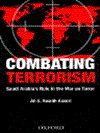

|
|
|
|
|
| Publication |
Oxford, Oxford University Press, 2009.
|
| Description |
xiii,196p.hbk
|
| Standard Number |
9780195478075
|
|
|
|
|
|
|
|
|
|
|
|
Copies: C:1/I:0,R:0,Q:0
Circulation
| Accession# | Call# | Current Location | Status | Policy | Location |
| 057015 | 363.3209538/ASS 057015 | Main | On Shelf | General | |
|
|
|
|
| 3 |
ID:
123728
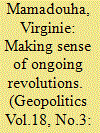

|
|
|
|
|
| Publication |
2013.
|
| Summary/Abstract |
Making sense of ongoing events is difficult for academics but a necessary exercise. The six books for review all address the events known as the Arab spring, Arab awakening, Arab revolt(s), Arab uprising(s), and Arab revolutions, that unfold after the self-immolation of Mohamed Bouazizi in Sidi Bouzid, Tunisia, on 17 December 2010. The different labels carry different connotations, be they bringing hope (spring, awakening), unarticulated mobilisations (revolt, uprising), or claims about results (revolution), while the
plural nuanced the sense of unity carried by the notion that the events in different Arab states were both linked together in a single historic moment and separated from other uprisings around the world. This separation is generally nuanced again by comparing the events to previous waves of uprisings, including the 2009 green movement in Iran, the 2005 Cedar revolution in Lebanon, the coloured revolutions in Serbia and former Soviet Republics in the 2000s, the 1989 movement ending communist rule in Europe, the 1974 Carnation revolution in Portugal, the 1968 students and civil rights movements, 1848, 1789 etc . . . . or the later urban movements like the Indignados and Occupy in 2011-2012.
|
|
|
|
|
|
|
|
|
|
|
|
|
|
|
|
| 4 |
ID:
134205
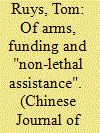

|
|
|
|
|
| Publication |
2014.
|
| Summary/Abstract |
In spite of legal objections, the European Union (EU) in May 2013 gave the conditional green light for the transfer of arms to the Syrian Opposition Council. The EU's decision is not a solitary move. Several other States, including Russia, the United States, Qatar and Saudi Arabia, have provided arms, funding and/or "non-lethal assistance" either to the Syrian government or to rebel forces combatting the Assad regime. The present contribution aims to shed light on the legality of such assistance. On the one hand, it assesses legal objections related to the fact that third-State assistance is used for the commission of widespread war crimes and human rights violations. On the other hand, it examines the compatibility of such assistance with the non-intervention principle and, in so doing, examines to what extent the latter principle discriminates between de jure governments and non-State armed groups in the context of a civil war.
|
|
|
|
|
|
|
|
|
|
|
|
|
|
|
|
| 5 |
ID:
124536
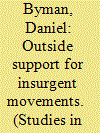

|
|
|
|
|
| Publication |
2013.
|
| Summary/Abstract |
When assessing insurgencies, understanding the role of transnational factors is vital. This article explores how outside powers support an insurgency, focusing on four types of actors: states, diasporas, refugees, and other insurgencies. It also examines the pitfalls and limits of outside support and assesses why such support is so hard to stop. The article concludes by offering implications for the conflict in Syria and discussing several policy implications with a particular emphasis on why outside support is hard to stop.
|
|
|
|
|
|
|
|
|
|
|
|
|
|
|
|
| 6 |
ID:
130937
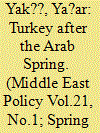

|
|
|
|
|
| Publication |
2014.
|
| Summary/Abstract |
Turkey's attitude regarding developments in the countries affected by the "Arab Spring" varied according to the approach of the ruling Justice and Development Party (Adalet ve Kalk?nma Partisi, AKP) and its perceptions of the countries in question.
In Tunisia, Annahda, a political party that originated from the Muslim Brotherhood (MB) tradition, emerged as the strongest political movement after the fall of the Ben Ali regime. Annahda has an ideological affinity with the AKP, which also has Islamist roots. There is, in addition, a deep-rooted tradition in Tunisia to regard Turkey as a source of inspiration for various reforms. Turkey was, at the beginning of the Arab Spring, referred to by some as a role model. This concept did not acquire much content as time went by, however.
In Libya, Turkey hesitated at the beginning to get involved in the crisis and even wanted to keep NATO out of it.1 Seeing, however, that "a coalition of the willing" was going to intervene with or without Turkey, it made a swift change and participated in the operations with six aircraft and five ships.
When the mainly Shia population of Bahrain wanted to follow the example of the other Arab Spring countries and protest against its Sunni ruler, Saudi Arabia formed a Gulf Cooperation Council (GCC) intervention force, composed mainly of Saudis, and repressed the demonstrations with a ruthlessness comparable to the methods used by the ousted regimes in the other Arab countries. The international community adopted a double standard and kept silent; Turkey went along with this consensus.
Turkey's reaction to the events in Yemen was restrained; it was viewed as a distant country and of low priority on the international agenda. The fact that Saudi Arabia stepped in as the main actor may also have played a role in Turkey's lack of enthusiasm for getting involved more deeply.
|
|
|
|
|
|
|
|
|
|
|
|
|
|
|
|
| 7 |
ID:
129672
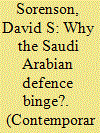

|
|
|
|
|
| Publication |
2014.
|
| Summary/Abstract |
Saudi Arabia is one of the most proliferate military spenders in the world, and this article assesses the multiple reasons for Saudi Arabian defence spending. Possible motives include arming against external threats, buying internal loyalty, gaining national prestige, and soliciting support from important external patrons, especially the United States. The article argues that while Saudi Arabia does seek to improve its military capability through increased defence spending, and gain prestige and internal support, the most significant reason for the increased investment for arms sales is to gain political support in the United States, as Saudi military money preserves some defence sector jobs in the American defence industry, potentially replacing American employment that would otherwise drop because of expected US defence budget reductions. By contributing in a small but targeted way to the American economy, Saudi Arabia can try to leverage American support for its security and foreign policy requirements.
|
|
|
|
|
|
|
|
|
|
|
|
|
|
|
|
|
|
|
|
|